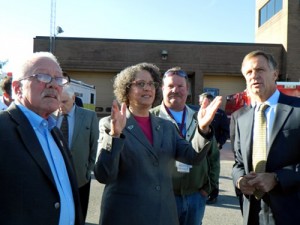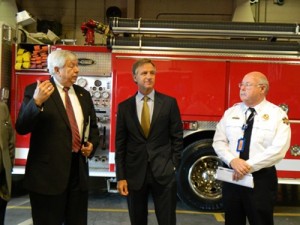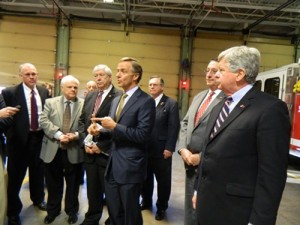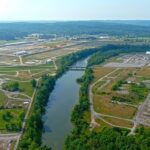
Sue Cange gives Gov. Bill Haslam, right, an update on the almost-completed demolition of the mile-long, U-shaped K-25 Building. Cange is deputy manager of the U.S. Department of Energy’s Office of Environmental Management. Also pictured are Leo Sain, left, president of cleanup contractor UCOR, and Jeff Tucker, UCOR deactivation and decommissioning manager.
It was built during World War II to help enrich uranium for the world’s first atomic bombs. Then, it helped win the Cold War. Now, the former K-25 site in west Oak Ridge presents a giant opportunity for economic development in Tennessee, Gov. Bill Haslam said during a tour last Friday.
“We have a real interest in what happens here,” Haslam said in a short meeting with reporters before getting a brief update on the demolition of the former mile-long, U-shaped K-25 Building, which was once the world’s largest building under one roof.
The governor said the K-25 site, now known as East Tennessee Technology Park or Heritage Center, has 2,000 flat acres with infrastructure already in place, including roads and rails, and it’s three miles from Interstate 40 and seven miles from Oak Ridge National Laboratory, the U.S. Department of Energy’s largest science and energy laboratory.
“We don’t have that opportunity in a lot of places,” Haslam said. “Finding 2,000 flat acres in East Tennessee is virtually impossible.”

Haslam, center, is pictured above with Oak Ridge Mayor Tom Beehan, left, and Fire Chief Darryl Kerley.
The state is involved in work at the site, helping to oversee cleanup efforts through the Tennessee Department of Environment and Conservation, and interested in bringing jobs to the region. Haslam said the cleanup of the site, once used to enrich uranium for nuclear weapons and commercial nuclear power plants, opens up unique development opportunities.
“This is a key tool that we can use to recruit businesses to Tennessee,” Haslam said.
Tennessee has had success in recruiting transportation and auto manufacturing companies to the state and companies in those industries would seem to be logical prospects, but Haslam left the door open to other industries as well, including anything related to the research being done at ORNL.

Also present with Haslam and Beehan are, from left, Roane County Executive Ron Woody, Sen. Ken Yager, Rep. John Ragan (third from right), Rep. Kent Calfee, and Sen. Randy McNally.
The ETTP cleanup is expected to last through at least 2020, and Haslam said he discussed federal cleanup funding with Energy Secretary Ernest Moniz a few weeks ago.
“Funding for cleanup in the budget continues to be an issue,” Haslam said.
The governor cited other assets near K-25, including the University of Tennessee, McGhee Tyson Airport, and Roane State and Pellissippi State community colleges.
“This is unique in Tennessee,” he said.












Leave a Reply